
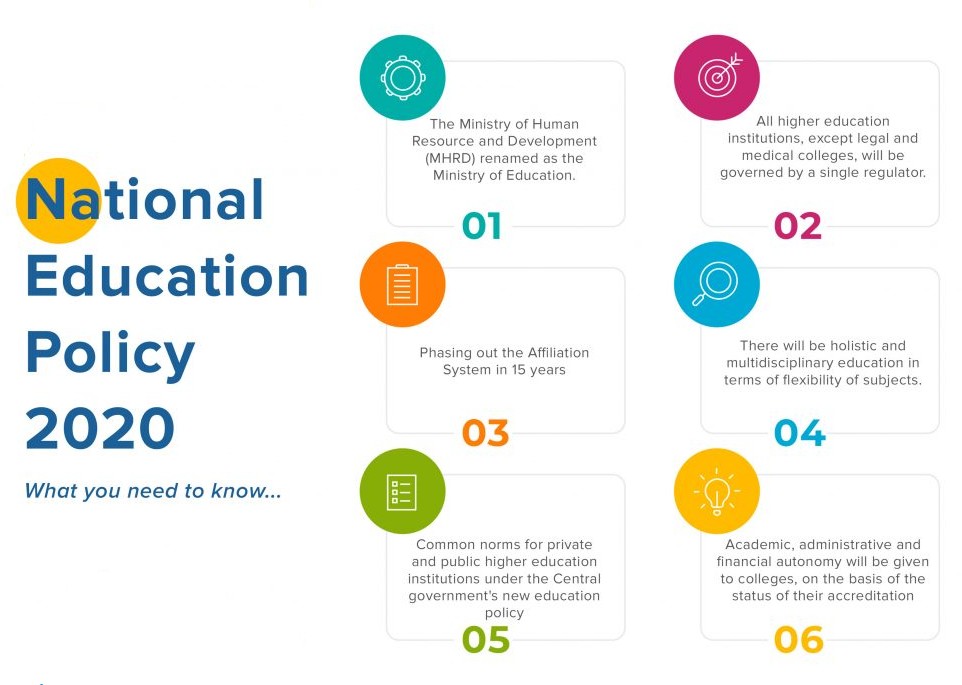
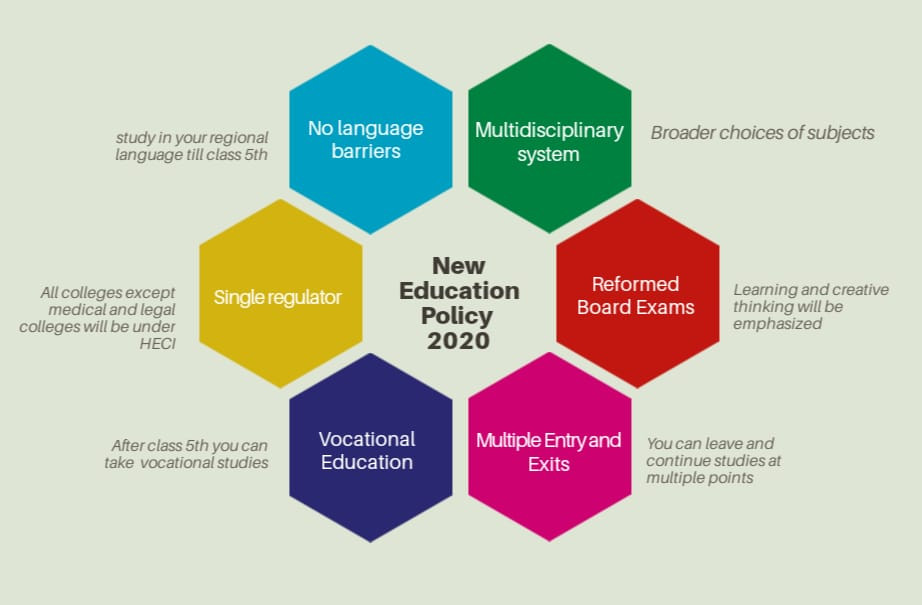
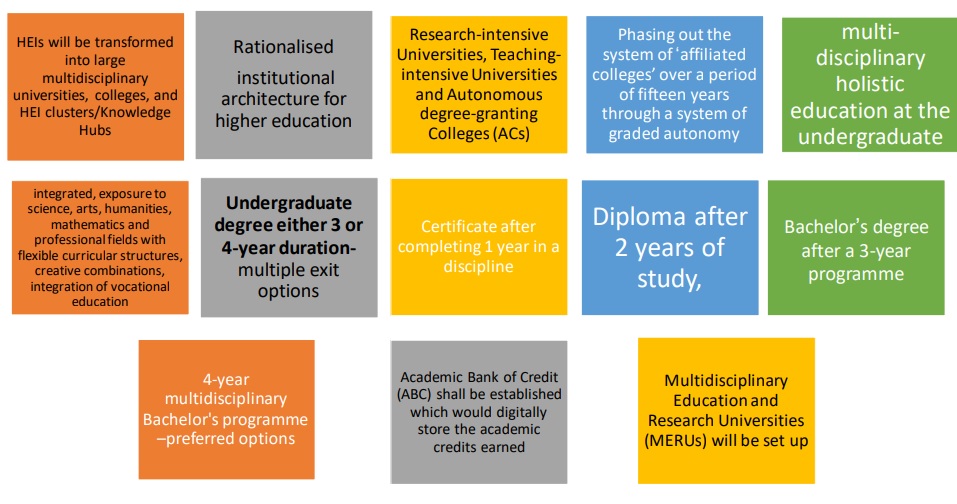
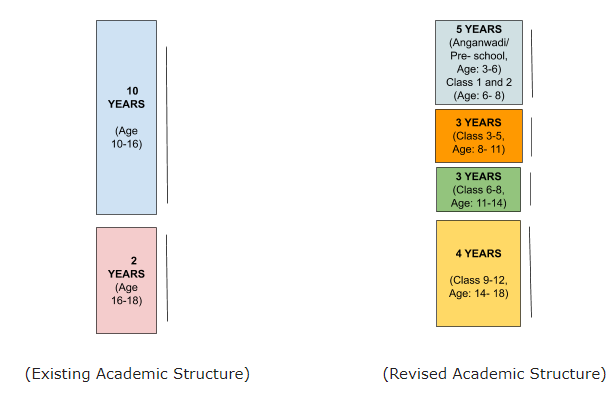
- The 10+2 system is substituted with a 5+3+3+4 system.
- This pedagogical transformation aims at bringing multiple pathways to learning.
- The new structure is divided based on cognitive developmental stages that is, early childhood, school years, and secondary stage.
- It is given the name of the ‘Foundation stage’.
- Children of age group 3 to 8 fall in this category.
- It encompasses the first three years of a child at Anganwadi/preschool/ playschool and kindergarten catering up to 3 to 6 years of age.
- To the same set, children aged 6 to 8 years who will be in grades 1 or 2 are also added to keep pace with their language skills, basic concepts, and activity curriculum.
- It is categorized as the ‘Preparatory stage’.
- Includes students from classes third to fifth. Their age group varies from 8 to 11.
- From now onwards, more attention will be diverted to the cognitive development of the child starting from classroom activities to interactive classroom learning sessions to making them understand numeracy skills.
- Till class fifth, the medium of language between the student-teacher would either be a regional one or mother-tongue as decided by the state.
- This is regarded as the ‘Middle stage’.
- It came into play for students of classes sixth to eighth.
- Coding will be taught from class 6th onwards to develop critical thinking.
- Promote experiential learning, learning in sciences, mathematics, social studies, and arts.
- It discouraged rote learning and promoted analytical and critical development.
- It is the ‘Secondary stage’.
- It includes classes ninth to twelfth.
- It includes a multidisciplinary study where students can pick any combination of subjects they want.
- Indian education does not train you to do work with your hands and it only revolves around ‘completing the syllabus’.
- The purpose of strictly bringing up vocational education as a compulsory subject is to prepare people to work as a technician or an artist. It encourages a person to have an insight into his/her hidden talents which can make them not only successful but also satisfied in their lives.
- Vocational training includes engaging oneself in cross-occupational competencies such as working on communication skills, personality development, self- management skills, etc.
- Arts, science, and commerce all of them are at an equal pace and now no distinction can be made in terms of choosing a particular set of subjects.
- The government will now follow a multidisciplinary approach. If a student wants to pursue fashion studies with chemistry or if one wants to learn mathematics with psychology, they’ll be allowed to do so.
- The neutral atmosphere amongst the students will not only provide them with the freedom to choose their subjects but will also eradicate the social- stigma attached to each stream.
- Holistic and Multidisciplinary Education -Flexibility of Subjects
- Multiple Entry / Exit
- UG Program – 3 or 4 year
- PG Program — 1 or 2 year
- Integrated 5 year Bachelor’s / Master’s
- MPhil to be discontinued
- Credit Transfer and Academic Bank of Credits
- HEls : Research Intensive/Teaching Intensive Universities and Autonomous Degree Granting Colleges
- Model Multidisciplinary Education and Research University (MERU) (in or near every District)
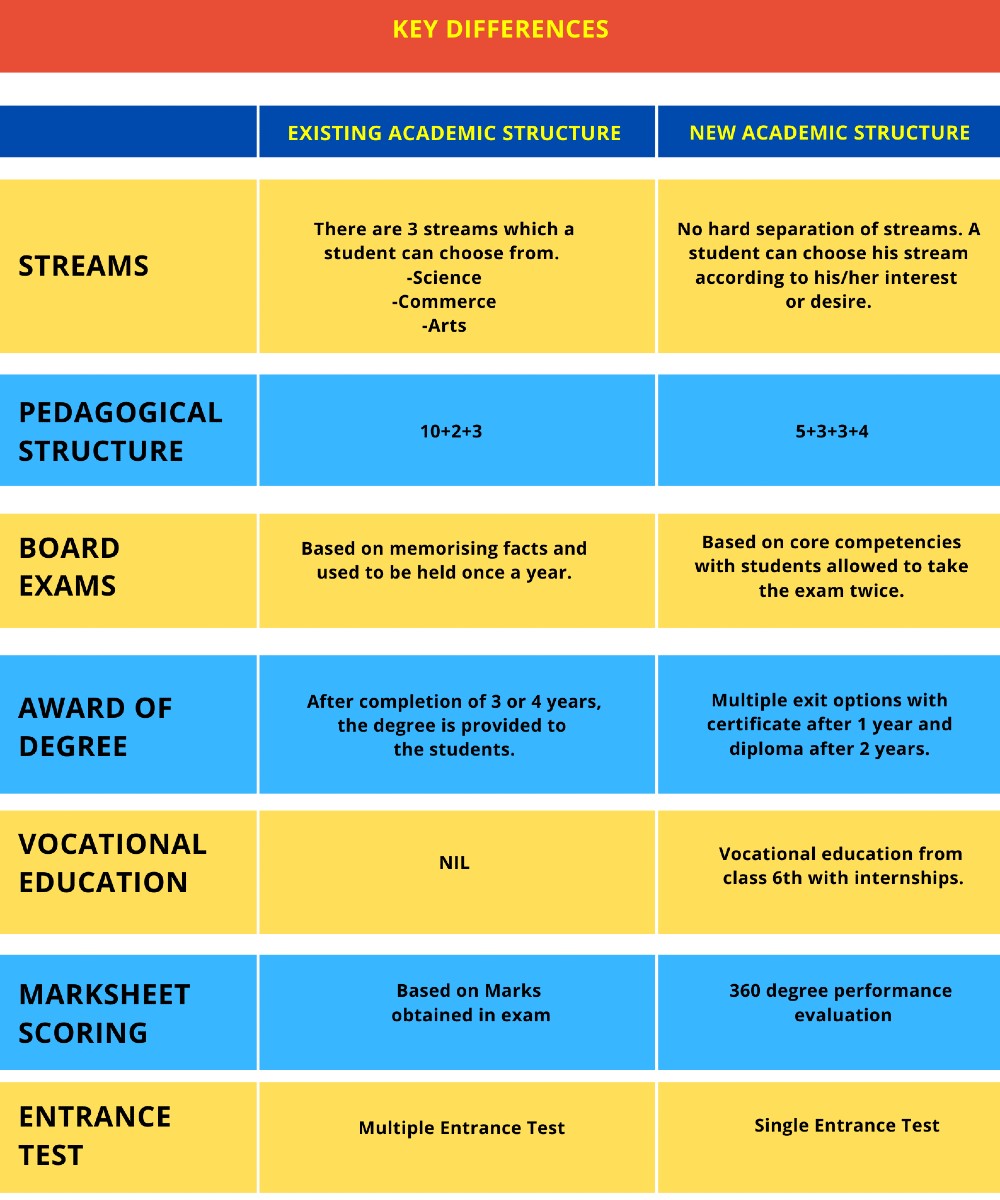
| Aspect | Before NEP 2020 (3-Year Degree) | 3-Year Degree (After NEP 2020) | 4-Year Degree (After NEP 2020) |
| Exit Option | Not Available (Available only for five-year Integrated Courses) | Available after 1st year, Second-Year | Available after 1st, 2nd and 3rd year |
|
Award of Degree |
Mandatory to complete the full duration of the programme | Candidates who wish to exit after the 1st year will be awarded a Certificate in the field of study Candidates who wish to exit after the 2nd year will be awarded a Diploma in the field of study Candidates who complete the three-years course will be awarded a degree. | Candidates who wish to continue after the 3rd year can specialize in a different field apart from the mandatory major or minor. Exit options will be applicable at par with three-year degree courses. |
| Scope of Research |
Minimal |
Candidates who do not wish to continue with 4th year will have to complete the research project in the 2nd-year of Master’s programme (applicable only for those students who opt for Master’s). |
Candidates who complete 4-year degree courses will also get ‘Degree with Research’ if he/ she completes rigorous research specified by the Higher Education institute. |
|
Type of Course |
Eligibility |
Course Details |
|
Type 1 – 2-Year Master’s Course |
Candidates who have completed a three-year Bachelor’s degree are eligible |
The second year of the course will be devoted to the research project and it is mandatory to complete the same. |
|
Type 2 – 1-Year Master’s Degree Course |
Candidates who have completed 4-year Bachelor’s degree programme with Research |
Research is not mandatory for a 1-year course, as students already complete their research project in a four-year Bachelor’s degree. |
|
Type 3 – 5-Year Integrated Bachelor’s/Master’s Programme |
To be Updated. |
To be Updated |